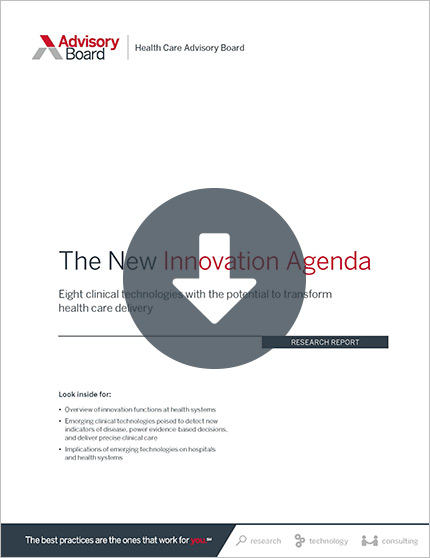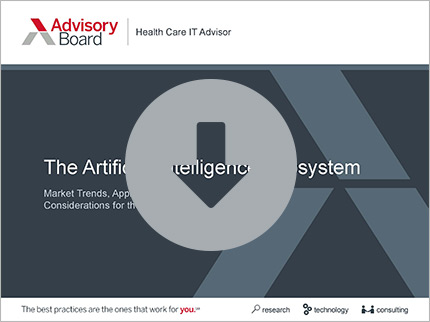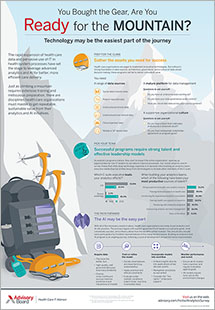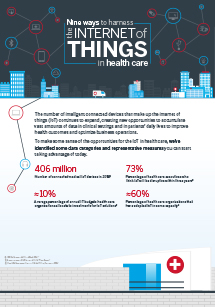Auto logout in seconds.
Continue LogoutEditor's note: This story was updated on May 28 to include several recent high-profile moves by the company
By Jackie Kimmell, Senior Analyst
Do you think you understand the full scope of Google's ambitions in health care?
Think again. The tech giant's health efforts—through its own projects and those of its parent company, Alphabet—are so far-reaching and ambitious that almost no one can keep track of them all.
There's Google Brain, focused on deep learning; Google Fit, dedicated to wearables; and Nest, a home automation brand. Then there are the independent teams within Alphabet, such as anti-aging company Calico, life-sciences research arm Verily, and data-storage platform Google Cloud—all of which have aspirations in health care.
And that's not all. GV, Alphabet's venture capital arm formerly called Google Ventures, has backed nearly 60 health-related companies—including big names such as 23andMe, Oscar Health, and Doctor on Demand. Alphabet has filed hundreds of patents related to health care, including 186 just between 2013 and 2017. And various Google and Alphabet teams are working on partnerships with major providers such as Stanford Medicine, Cleveland Clinic, and Mayo Clinic.
(And believe it or not, that's still not all. Did you know the company offers a spoon for people with movement disorders, or is working on a mosquito-fighting technology to prevent Zika?)
It's a lot—more than could possibly be covered in a single article. So rather than offering a comprehensive, and overwhelming, list of Google's projects, let's take a step back and ask a bigger question: What's the endgame for all of these ambitious, but seemingly disconnected, health care ventures?
Daily Briefing highlights six themes uniting Google's health care projects—and inherent within them, six visions for the future of "Google health care."
Google wants to store your health care data. (Lots and lots of data.)
Perhaps the most natural fit for Google in the health care industry is the storage and management of big data—and the company has invested heavily in making their data warehousing, machine learning, and even G Suite tools HIPAA-compliant.
Google Cloud's recent partnership with NIH on the STRIDES Initiative has made its storage, computing, and machine learning capabilities available to 2,500 research institutions across the country. And Google Cloud recently added former Cleveland Clinic CEO Toby Cosgrove as an advisor, suggesting that it has bigger aspirations to target providers.
But Google doesn't just want to store your data, it wants to make your data interoperable and accessible. Google in 2016 spent $625 million to acquire Apigee, a company that helps companies design and application programming interfaces (APIs) to manage data. A number of hospitals and health systems are already using Apigee's platform, including Cleveland Clinic, Kaiser Permanente, Rush University Medical Center, as well as other industry players such McKesson and Walgreens.
Getting data into organized, standardized formats remains a core challenge of advancing technological innovation, as Google ran into when training a recent clinical algorithm. To achieve success in any of its other health care endeavors, Google has to figure out how to both store the data and have it be in an extractable format.
Google wants to help you crunch all that data, too
Google not only has the capacity to store nearly incomprehensible amounts of data. It also has machine learning capabilities to analyze and gain insights from all that information.
One of Google's most intriguing products for providers is BigQuery, a HIPAA-compliant, server-less data warehouse that enables providers to combine and analyze patient records with other massive datasets. For instance, the Colorado Center for Personalized Medicine at the University of Colorado Medicine has used BigQuery to construct a genomics database for nearly six million patients. Their project fuses genomics data from the center with EHR records from the University of Colorado system and external insurance claims, public health data, and environmental data to develop personalized therapies for patients.
Google also is working on new ways to crunch difficult-to-standardize patient information, such as X-rays and physician notes, via pilot partnerships with UC San Francisco, Stanford Medicine and University of Chicago Medicine.
Finally, they want to use their data analytics to revamp the clinical trial. Verily recently announced strategic partnerships with Novartis, Sanofi, Otsuka, and Pfizer aimed at making it easier for patients to enroll and participate in clinical trials. For instance, if someone searches ways to relieve asthma symptoms, they could receive targeted ads suggesting they sign up for relevant asthma-related clinical trials. They're exploring trial opportunities in cardiovascular disease, oncology, behavioral health, dermatology, and diabetes. Verily also wants to make it easier to aggregate clinical data across many sources—like from EHRs or wearables.
'Dr. Google' may someday diagnose diseases better than human doctors
Google also is building algorithms to diagnose various clinical conditions—sometimes, more successfully than human doctors.
For instance, one Google-created algorithm was shown by Stanford researchers to diagnose skin cancer as well as a dermatologist, while another algorithm was as effective at diagnosing certain eye diseases as ophthalmologists. Yet another showed 99% accuracy at detecting breast cancer in lymph node biopsies.
In May 2019, a study in Nature Medicine found Google's lung cancer screening algorithm outperformed all radiologists in the control group at correctly diagnosing the cancer—detecting 5% more true positives and cutting false positives by 11%. "It's going to prevent more bad things from happening to people who are being screened," said Dr. Otis Brawley, a professor of oncology at Johns Hopkins and former VP of the American Cancer Society.
Google has stressed that such tools are not intended to replace doctors' clinical decision making but, in the example of the lymph node biopsy algorithm, "naturally complement pathologists' workflow." And of course, before any of these machine learning tools could be used more widely, they would have to undergo extensive testing, especially to ensure that developers can deconstruct the "black box" assumptions that drive the models' conclusions.
Google wants to build 'smart' health products—with or without industry partners
Google also is exploring a range of consumer-focused health products—particularly through Verily, which has focused especially on the 30 million Americans with diabetes. One product, created in partnership with the medical device company Dexcom, is a small continuous glucose monitor that has been submitted to FDA for approval. Verily also is working on building a disposable glucose sensor that would be worn like a bandage for up to 14 days and would require no finger stick calibrations.
Verily also has its own answer to the Apple Watch, called the Study Watch. The Watch hasn't been sold to the public yet, but it's being used to study predictors of heart disease in a partnership with Stanford Medicine and Duke University called Baseline. Further, the recent FDA clearance for the Study Watch's electrocardiogram feature could be a step toward wider sales.
And that's not all: Google has also teamed up with Fitbit to wade into the wearables market, aiming to and unite patient-generated wearables data with patient EHRs.
Google wants to sell Internet of Things (IoT) devices for your home—and nursing homes
Google's home automation subsidiary Nest is designing products with an emphasis on meeting the needs of older Americans. CNBC reports that the company has approached senior living facilities to pitch its products, suggesting using its motion sensor to automatically turn on the lights when seniors get up in the middle of the night. More than one million Americans live in assisted living facilities, which means this could be a ripe market.
Google's home devices could also help consumers access the vast store of patient-facing health information available via Google's ubiquitous search engine. Since 2015, Google has partnered with Mayo Clinic and Harvard Medical School to provide disease, symptom, and treatment information for common conditions via web search. In the future, that information may be delivered via voice assistants or other home devices that could also track medication adherence, support disease management, or detect medical anomalies.
Google wants to cut your clinical documentation burden
The health care industry is working hard to decrease physicians' documentation burden, and Google wants to help. The company has developed a system that automatically transcribes conversations between physicians and patients, and as of 2017 it had a roughly 20% error rate. Google is planning to launch a pilot study on the technology with Stanford Family Medicine.
The company is also building a model to auto-complete and detect errors in doctors' notes—in addition to other, more secretive moves in this space. "We are on a path right now to building very powerful tools that require the practitioner to move from their traditional screen to some smartphone or some app," said former Executive Chairman of Alphabet Eric Schmidt at last year's HIMSS conference, adding, "We're much closer than you think we are."
The trillion-dollar question: Can Google succeed?
So Google has big ambitions. But are they actually going anywhere?
Up until now, Google has gained a reputation for investing in health care "moonshots," many of which have misfired. (Remember their tricorder project, which promised to use nanoparticles and magnets for early disease detection?) But the company's recent strategy appears more focused on incremental developments built through industry partnerships, which could prove to be firmer footing.
Still, succeeding in health care will require fundamentally changing Google's business model. Traditionally, Google has made most of its money by selling consumer data to advertisers—which could make patients hesitate before handing the tech giant their private health data.
Perhaps surprisingly, Google seems to be doing better than other tech companies at building patient trust. In a recent Rock Health survey, 60% of consumers who were willing to trust big tech with their data said they would be willing to share their data with Google, compared with 53% for Amazon and 49% for Apple. Still, since only 11% of respondents on the survey in general were willing to share their data with Big Tech, Google is still facing an uphill battle.
To succeed in any of the areas, Google will have to prove its value proposition in a competitive market in the face of constant competition from other big tech vendors. Still, the fact that the company is investing so heavily in so many simultaneous projects means the potential for success—at least in one of these main areas—is huge.
Next steps
To discover more about the market for AI—and the market trends, applications, and considerations for providers—download our research report on The Artificial Intelligence Ecosystem.
Don't miss out on the latest Advisory Board insights
Create your free account to access 1 resource, including the latest research and webinars.
Want access without creating an account?
You have 1 free members-only resource remaining this month.
1 free members-only resources remaining
1 free members-only resources remaining
You've reached your limit of free insights
Become a member to access all of Advisory Board's resources, events, and experts
Never miss out on the latest innovative health care content tailored to you.
Benefits include:
You've reached your limit of free insights
Become a member to access all of Advisory Board's resources, events, and experts
Never miss out on the latest innovative health care content tailored to you.
Benefits include:
This content is available through your Curated Research partnership with Advisory Board. Click on ‘view this resource’ to read the full piece
Email ask@advisory.com to learn more
Click on ‘Become a Member’ to learn about the benefits of a Full-Access partnership with Advisory Board
Never miss out on the latest innovative health care content tailored to you.
Benefits Include:
This is for members only. Learn more.
Click on ‘Become a Member’ to learn about the benefits of a Full-Access partnership with Advisory Board
Never miss out on the latest innovative health care content tailored to you.




